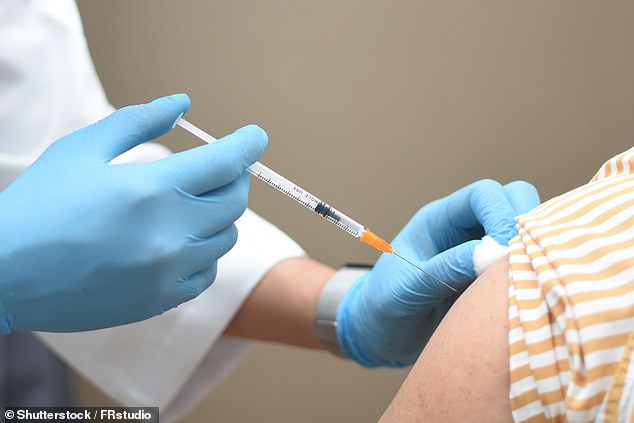One in four working-age adults in England suffering from winter viruses have flu, as the NHS braces for a “quadremic” driven by a tidal wave of winter illnesses.
Surveillance data from the UK Health Security Agency (UKHSA) shows that one in five tests carried out on Britons of all ages with coughs and colds at the end of last week came back positive for the flu virus.
This represents an increase from about one in 10 positive tests the week before, and is another sign that the virus is spreading through the population.
It comes as health leaders urged those eligible for free flu jabs to take up the offer, with current take-up well below what experts say is needed to protect the health service from being overwhelmed.
The latest results of positive flu tests, from December 8, are almost three times higher than the level recorded at the same time last year.
But not all Britons are suffering the same impact. Flu positivity was 25.7 percent among tested British adults aged 25 to 54, a rate of about one in four.
This was narrowly surpassed by Britons aged 15 to 24 with a positivity rate of 26 per cent and children aged five to 14 who had a rate of 30 per cent, the highest of any group.
Flu rates among Britons over 65, who are eligible to receive a vaccine on the NHS, hovered around one in six.
Surveillance data from the UK Health Security Agency shows that one in five tests (18.6 per cent) carried out on people with flu symptoms came back positive for the flu virus.
It comes as separate figures, from NHS England, show the number of people hospitalized with flu has risen by 70 per cent in just one week.
NHS data shows that, on average, almost 1,900 patients were hospitalized with flu every day last week in England.
This is up from the previous week’s average of 1,100 and is 3.5 times more patients than the same time last year.
Compounding the NHS’s problems, severe cases of norovirus and RSV are also increasing.
With Covid cases also potentially at play, Professor Sir Stephen Powis, medical director of NHS England, said health chiefs are concerned.
The flood of flu cases and other seasonal viruses hitting hospitals is really worrying for patients and the NHS; The numbers add to our “quadraemia” concerns, he said.
Susan Hopkins, UKHSA chief medical adviser, said data suggests the threat of an early flu season “is materializing” and encouraged those eligible to come forward and get vaccinated.
“Given that winter vaccination has not yet reached the high levels we are looking for in some eligible groups, including healthcare workers, our forecasts for infection rates are not improving,” he said.
“Getting the vaccine will avoid jeopardizing your seasonal plans and, more importantly, avoid the risk of serious illness and hospitalization.”
He added: “Older people and people with weakened immune systems are at higher risk of more severe illness from the flu or norovirus, so if you have flu-like symptoms or diarrhea or vomiting, avoid visiting to people in hospitals and nursing homes to avoid contagion. on infection in these environments.
Professor Chris Whitty, England’s chief medical officer, said: “The latest data is clear: flu is increasing rapidly and we are approaching a serious flu wave.”
“Now is the time to get vaccinated if you are eligible.”

NHS leaders urge people eligible for flu jab to come forward ‘without delay’
People over 65, people with long-term health conditions, pregnant women, nursing home residents and caregivers can receive a free vaccine.
There are signs that calls have been heard for eligible Britons to roll up their sleeves and take a jab.
NHS England said the number of appointments booked for flu and Covid vaccinations has more than doubled from 9,452 on Wednesday to 21,144 on Thursday, an increase of 124 per cent.
Fears of a bad flu year come just days after experts warned this year’s flu vaccine could be 30 percent less effective than expected.
The flu vaccine is changed each year based on data from southern hemisphere countries such as Australia and New Zealand, which have their winter season six months earlier than Britain.
This is because the same types of flu that affected those countries tend to cause the majority of cases in the UK.
However, sometimes this prediction is wrong. In 2017, a mismatched flu vaccine was responsible for an extra 50,000 deaths in the UK, according to the Office for National Statistics.
Data suggests that the flu vaccine used in the southern hemisphere, on which the one being rolled out in the UK is based, could be up to 30 per cent less effective than normal.
Experts consider a successful flu vaccine to be one that prevents people from needing hospital care for the virus in about 7 out of 10 cases.
However, data from countries such as Australia and New Zealand suggest that the latest vaccine only stopped 4 in 10 hospitalizations.
Flu, also called influenza, is responsible for around 40,000 hospitalizations and more than 10,000 deaths in the UK each year, although this figure can be higher in bad years.
Symptoms usually include fever, sore throat, muscle aches, and cough.

